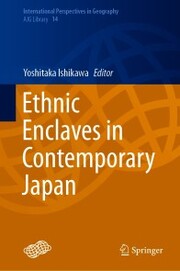Detailansicht
Ethnic Enclaves in Contemporary Japan
eBook - International Perspectives in Geography
ISBN/EAN: 9789813369955
Umbreit-Nr.: 1865169
Sprache:
Englisch
Umfang: 0 S., 28.72 MB
Format in cm:
Einband:
Keine Angabe
Erschienen am 01.04.2021
Auflage: 1/2021
E-Book
Format: PDF
DRM: Digitales Wasserzeichen
- Zusatztext
- This book is the first work to comprehensively investigate the enclaves of non-Japanese residents in Japan. In a comparative study, it convincingly examines eight enclaves of five nationalities (Chinese, Korean, Filipino, Brazilian and Turkish) in twelve municipalities. Japan now leads in terms of depopulation in countries affiliated with the Organisation for Economic Co-operation and Development (OECD). The fact that the country has been supplementing the decreased number of Japanese nationals with an increase in migrants, who form enclaves, has attracted great attention. The temporal development and status quo of such enclaves are important concerns of researchers, policymakers and the general public. This publication is the result of joint studies by geographers and sociologists and contributes to a more detailed understanding of these topics. It thus represents a valuable achievement in the study of the segregation and enclave formation of minority nationalities. The empirical validity of existing explanatory frameworks, such as spatial assimilation and heterolocalism, is also discussed in a Japanese context.
- Kurztext
- This book is the first work to comprehensively investigate the enclaves of non-Japanese residents in Japan. In a comparative study, it convincingly examines eight enclaves of five nationalities (Chinese, Korean, Filipino, Brazilian and Turkish) in twelve municipalities. Japan now leads in terms of depopulation in countries affiliated with the Organisation for Economic Co-operation and Development (OECD). The fact that the country has been supplementing the decreased number of Japanese nationals with an increase in migrants, who form enclaves, has attracted great attention. The temporal development and status quo of such enclaves are important concerns of researchers, policymakers and the general public. This publication is the result of joint studies by geographers and sociologists and contributes to a more detailed understanding of these topics. It thus represents a valuable achievement in the study of the segregation and enclave formation of minority nationalities. The empirical validity of existing explanatory frameworks, such as spatial assimilation and heterolocalism, is also discussed in a Japanese context.
- Autorenportrait
- Yoshitaka Ishikawa is a professor in the Faculty of Economics, Teikyo University, and an emeritus professor of Kyoto University. He received his D.Litt. in geography from the Graduate School of Letters, Kyoto University, in 1994. His main interests until about 2000 revolved around internal migration and the related temporal changes, as well as modeling spatial interactions such as migration. Since the beginning of the new century, his chief concern has been international migration and non-Japanese residents such as ethnic minorities. In more recent years, he has been keenly interested in the population decline of Japan and possible solutions to this problem. He is a leading Japanese population geographer who has contributed to international geography by publishing many books and papers on such research topics as internal/international migration and non-native residents. He served as an editorial board member of the journal Population, Space and Place (formerly the International Journalof Population Geography) for 20 years from 1995 and as the secretary-general of the International Geographical Union (IGU) Commission on Global Change and Human Mobility for 12 years from 2000. He won the IGU Lauréat dhonneur for the year 2020.
